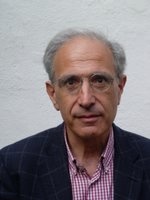Be inspired by film
Pangea Day is a global event which will bring the world together through film. It takes place starting at 18:00 GMT on 10th May 2008. Public locations in Cairo, Kigali, Jerusalem, London, Los Angeles, Mumbai, and Rio de Janeiro will be linked for a live programme of films, music and visionary speeches, which will be broadcast in seven languages to millions of people worldwide through the internet, television and mobile phones.
Twenty-four short films will be shown which were selected through an international competition which generated more than 2,500 submissions from over 100 countries. The films were chosen based on their ability to inspire, transform, and allow us see the world through another person's eyes. The programme will also include contributions from such “luminaries” as Queen Noor of Jordan, CNN broadcaster Christiane Amanpour and Live8 activist Bob Geldof.
Thousands of people across the world are organising their own local “Friends of Pangea Day” event. These will be held in people’s homes and backyards, in schools and offices, in cinemas, outdoors in parks and on public beaches, and even in a Bedouin camp.
What you can do to support Pangea Day: You can sign up to organise your own public or private screening; or you can attend one of the events being held near you (check these out on the Pangea website); or you can view the programme which is being streamed from the Pangea website.
Pangea Day was created by award-winning Egyptian-American documentary filmmaker Jehane Noujaim as her 2006 TED Prizewinning wish in collaboration with TED and Nokia.
Pangea Day: www.pangeaday.org
Jehane Noujaim: http://en.wikipedia.org/wiki/Jehane_Noujaim
Be inspired by ideas
TED stands for Technology, Entertainment, Design. It was started in 1984 to bring together people from those three worlds for creative interaction. TED is a global network of people from every discipline and culture with two things in common – they are looking for a deeper understanding of the world, and they hope to turn that understanding into a better future for all of us.
TED’s annual conference brings together some of the world's most fascinating thinkers and doers, who are given 18 minutes to present their ideas and inspire the audience.
The TED website has an archive of 200 talks, and more are being added all the time. These videos are released under a Creative Commons license, so they can be freely shared.
The TED Prize which was launched in 2005 is awarded annually to three exceptional individuals who each receive $100,000 and the granting of "One Wish to Change the World”. After several months of preparation, they unveil their wish at an award ceremony which is held during the TED Conference. These wishes then lead on to collaborative initiatives with far-reaching impact.
TED is now run by IT magazine entrepreneur Chris Anderson, who acquired it from its founders in 2000 via his New York-based Sapling Foundation which aims to foster the spread of great ideas and provide a platform for the world’s smartest thinkers.
These are the TED Prizewinners for 2008 and their wishes. Go to the TED Prize website to find out how their wishes are being turned into practice.
Karen Armstrong: "… the creation, launch and propagation of a Charter for Compassion, crafted by a group of leading inspirational thinkers from the three Abrahamic traditions of Judaism, Christianity and Islam and based on the fundamental principles of universal justice and respect."
Dave Eggers: “… you personally and every creative individual and organization you know to find a way of directly engaging with a public school in your area and that you'll then tell the story of how you got involved, so that within a year we have 1,000 examples of innovative partnerships."
Neil Turok: “… to unlock and nurture scientific talent across Africa, so that within our lifetimes we are celebrating an African Einstein."
Find out how these prizewinners with the support of TED are making these dreams come true.
How to support the spread of ideas through TED
1. Spread ideas. Email your favorite TED talks, speakers and themes to other people. There's a link on each page that enables you to do this easily.
2. Join the conversation. Add your own comments to TED's discussion pages.
3. Host a TED session at work, perhaps a lunch break. This might inspire out-of-the-box thinking.
4. Host a TED salon at your home. Invite half a dozen people around for an evening to listen to two or three talks and then engage in discussion.
5. Use TED Talks as a classroom resource, if you're a teacher.
6. Post a TED Talk on your blog or website, if it particularly interests you.
7. Make a contribution to the Sapling Foundation.
And if you have an idea for spreading TED ideas, then write in with your suggestion. If you have a powerful idea of your own that you'd like to share with the world, record it and send it to us.
If you do any of the above with exciting results, tell us about it. Others can learn from your experience.
TED: www.ted.com
The TED Prize: www.tedprize.org


0 Comments:
Post a Comment
<< Home